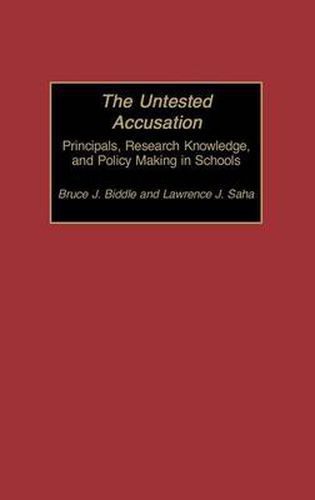Readings Newsletter
Become a Readings Member to make your shopping experience even easier.
Sign in or sign up for free!
You’re not far away from qualifying for FREE standard shipping within Australia
You’ve qualified for FREE standard shipping within Australia
The cart is loading…






Compares the usefulness and relevance of research knowledge among public, parochial, and independent schools; primary and secondary education; and in two differing national contexts: one (the United States) featuring a decentralized educational system organized around local school districts, the other (Australia) offering a more centralized system largely controlled at the state and federal levels. The authors begin by reviewing prior assertions, scholarly discussions, and evidence concerning the impact of social research in other fields as well as education. They then provide a conceptual model for thinking about the problem and details of the study upon which the book is based, which consisted of in-depth interviews with 120 school principals in the United States and Australia. These interviews generated quantitative as well as qualitative data, and the substantive chapters of this monograph provide both statistical evidence and verbal materials, illustrating major points, quoted from the principals interviewed. Principals report how they have been exposed to research knowledge, their attitudes concerning research knowledge and innovation in their schools, the types of research knowledge they talk about spontaneously, their familiarity with preselected research topics, and the ways in which they have used or plan to use research knowledge.
$9.00 standard shipping within Australia
FREE standard shipping within Australia for orders over $100.00
Express & International shipping calculated at checkout
Compares the usefulness and relevance of research knowledge among public, parochial, and independent schools; primary and secondary education; and in two differing national contexts: one (the United States) featuring a decentralized educational system organized around local school districts, the other (Australia) offering a more centralized system largely controlled at the state and federal levels. The authors begin by reviewing prior assertions, scholarly discussions, and evidence concerning the impact of social research in other fields as well as education. They then provide a conceptual model for thinking about the problem and details of the study upon which the book is based, which consisted of in-depth interviews with 120 school principals in the United States and Australia. These interviews generated quantitative as well as qualitative data, and the substantive chapters of this monograph provide both statistical evidence and verbal materials, illustrating major points, quoted from the principals interviewed. Principals report how they have been exposed to research knowledge, their attitudes concerning research knowledge and innovation in their schools, the types of research knowledge they talk about spontaneously, their familiarity with preselected research topics, and the ways in which they have used or plan to use research knowledge.